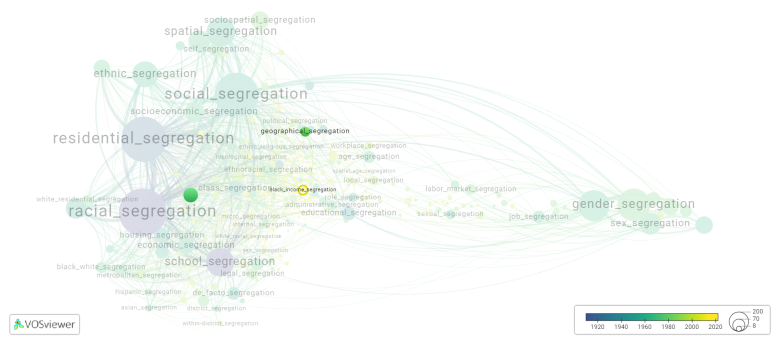Black income segregation: Difference between revisions
(Creating page) |
(Creating page) |
||
| (9 intermediate revisions by the same user not shown) | |||
| Line 1: | Line 1: | ||
===== Date and country of first publication<ref>Date and country of first publication as informed by the Scopus database (December 2023).</ref>===== | |||
2018<br> | 2018<br> | ||
United States | |||
===== Definition ===== | |||
Black income segregation refers to the concentration of lower-income black individuals or families in specific neighborhoods or areas. This phenomenon is a manifestation of systemic racism and socioeconomic inequalities that have persisted over time. Black income segregation can result from various factors, including discriminatory housing practices, limited economic opportunities, and a lack of access to quality education and healthcare. | Black income segregation refers to the concentration of lower-income black individuals or families in specific neighborhoods or areas. This phenomenon is a manifestation of systemic racism and socioeconomic inequalities that have persisted over time. Black income segregation can result from various factors, including discriminatory housing practices, limited economic opportunities, and a lack of access to quality education and healthcare. | ||
| Line 12: | Line 12: | ||
Efforts to address black income segregation require systemic changes that address the root causes of racial inequities. Initiatives promoting fair housing practices, equitable access to education and healthcare, and economic opportunities can help dismantle the barriers that contribute to this form of segregation. Additionally, tackling systemic racism and promoting racial justice are essential to creating inclusive communities where individuals of all races can thrive. | Efforts to address black income segregation require systemic changes that address the root causes of racial inequities. Initiatives promoting fair housing practices, equitable access to education and healthcare, and economic opportunities can help dismantle the barriers that contribute to this form of segregation. Additionally, tackling systemic racism and promoting racial justice are essential to creating inclusive communities where individuals of all races can thrive. | ||
==See also== | ==See also== | ||
==Related segregation forms== | |||
Black income segregation is frequently discussed in the literature with the following segregation forms: | |||
[[income segregation]], [[geographical segregation]] | |||
[[File:black_income_segregation.png|780x780px]] | |||
This visualization is based on the study [[Segregation_Wiki:About| The Multidisciplinary Landscape of Segregation Research]]. | |||
For the complete network of interrelated segregation forms, please refer to: | |||
* [https://tinyurl.com/2235lkhw First year of publication] | |||
* [https://tinyurl.com/2d8wg5n3 Louvain clusters] | |||
* [https://tinyurl.com/223udk5r Betweenness centrality] | |||
* [https://tinyurl.com/244d8unz Disciplines in which segregation forms first emerged (Scopus database).] | |||
==References== | ==References== | ||
==Notes== | ==Notes== | ||
<references /> | <references /> | ||
== | {{NoteAI}} | ||
==Black income segregation appears in the following literature== | |||
Reardon S.F. | Reardon S.F., Bischoff K. (2018). Income Inequality and Income Segregation. ''Inequality in the 21st Century: A Reader'', 426-435. Taylor and Francis.https://doi.org/10.4324/9780429499821-73 | ||
Latest revision as of 07:17, 16 October 2024
Date and country of first publication[1][edit | edit source]
2018
United States
Definition[edit | edit source]
Black income segregation refers to the concentration of lower-income black individuals or families in specific neighborhoods or areas. This phenomenon is a manifestation of systemic racism and socioeconomic inequalities that have persisted over time. Black income segregation can result from various factors, including discriminatory housing practices, limited economic opportunities, and a lack of access to quality education and healthcare.
Historically, redlining practices by banks and real estate agents prevented black Americans from purchasing homes or obtaining loans in predominantly white neighborhoods, leading to the creation of racially segregated neighborhoods. This segregation perpetuated economic disparities, as limited access to resources and opportunities in these neighborhoods hindered upward mobility for black individuals and families.
Black income segregation has wide-ranging negative consequences, including limited access to quality schools, healthcare facilities, and job opportunities. Concentrated poverty and lack of resources in these neighborhoods further perpetuate cycles of poverty and inequality. Additionally, black income segregation can result in decreased political representation and limited social networks, exacerbating the marginalization of black communities.
Efforts to address black income segregation require systemic changes that address the root causes of racial inequities. Initiatives promoting fair housing practices, equitable access to education and healthcare, and economic opportunities can help dismantle the barriers that contribute to this form of segregation. Additionally, tackling systemic racism and promoting racial justice are essential to creating inclusive communities where individuals of all races can thrive.
See also[edit | edit source]
Related segregation forms[edit | edit source]
Black income segregation is frequently discussed in the literature with the following segregation forms:
income segregation, geographical segregation

This visualization is based on the study The Multidisciplinary Landscape of Segregation Research.
For the complete network of interrelated segregation forms, please refer to:
References[edit | edit source]
Notes[edit | edit source]
- ↑ Date and country of first publication as informed by the Scopus database (December 2023).
At its current state, this definition has been generated by a Large Language Model (LLM) so far without review by an independent researcher or a member of the curating team of segregation experts that keep the Segregation Wiki online. While we strive for accuracy, we cannot guarantee its reliability, completeness and timeliness. Please use this content with caution and verify information as needed. Also, feel free to improve on the definition as you see fit, including the use of references and other informational resources. We value your input in enhancing the quality and accuracy of the definitions of segregation forms collectively offered in the Segregation Wiki ©.
Black income segregation appears in the following literature[edit | edit source]
Reardon S.F., Bischoff K. (2018). Income Inequality and Income Segregation. Inequality in the 21st Century: A Reader, 426-435. Taylor and Francis.https://doi.org/10.4324/9780429499821-73
